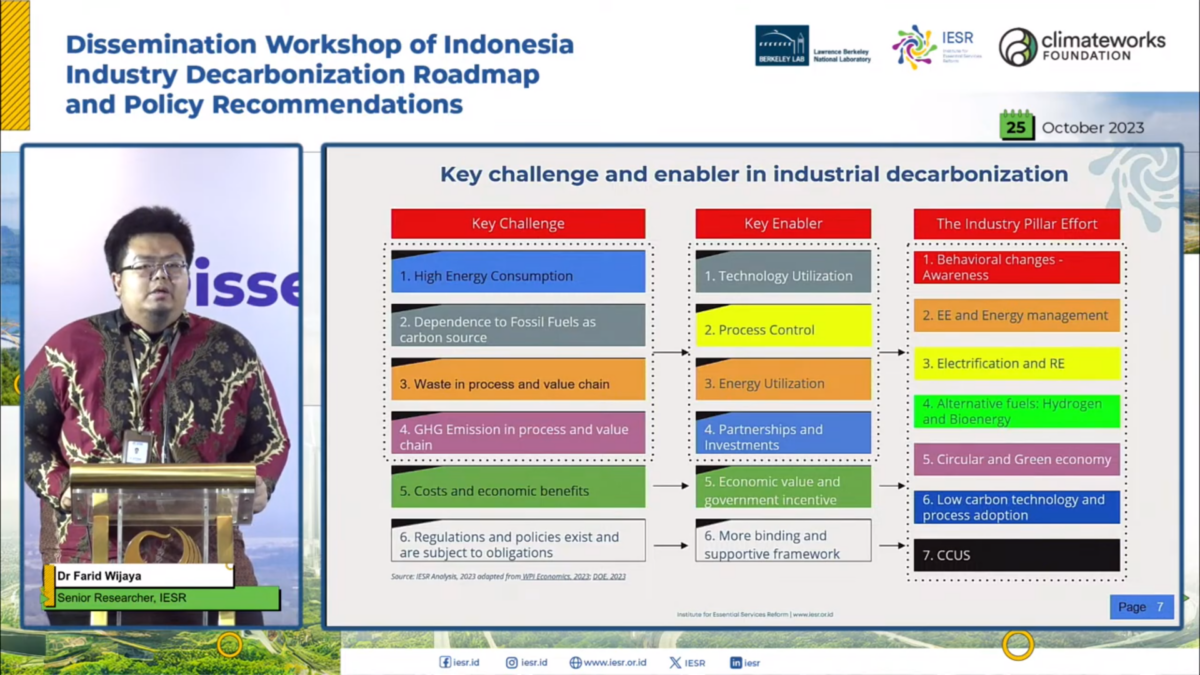Jakarta, 25 October 2023 – Industry is the main driver for economic growth and the largest sector to stimulate technology advancement. Industrial-scale economic activity has already transformed the global economy since its peak. Unfortunately, the tremendous economic growth must be paid for by the high greenhouse gas emissions transmitted.
For a while, people are trying to figure out a way to minimize the GHG emission from the industrial process. This effort will be a meaningful step in the race to achieve net zero emission in this century as it is mandated by the Paris Agreement.
Deon Arinaldo, Energy Transformation Program Manager at the Institute for Essential Services Reform (IESR) during the Dissemination Workshop of Indonesia Industry Decarbonization Roadmap and Policy Recommendation on Wednesday 25th October 2023 said that IESR is currently looking into five big industries i.e cement, pulp & paper, steel, textile, and ammonia and develop a decarbonization roadmap.
“We are in the beginning of decarbonizing our industry sector, and we need more collaboration between stakeholders as there are just so many stakeholders involved in the industry sector,” Deon said.
Farid Wijaya, senior analyst IESR later explained that Indonesia has initiated a green industry policy framework, yet it still needs more improvement to make it more robust and contextual.
“The five industries that we are looking at are highly motivated to decarbonize their business process, but currently there are still challenges such as the cost and policy framework that still need to be improved,” explained Farid.
Realizing that the industrial process requires a vast amount of energy from electricity to decarbonize the industry sector, it is a must to also decarbonize the power sector.
“(The availability) of policies that support industry to connect to renewable power or develop its own renewable electricity are very important,” said Hongyou Lu, Energy and Environment Technology Researcher, LBNL.
Lu added that industry decarbonization is inevitable but multifaceted and it has potential to grow the local economy, reduce air pollution and make the commodity more competitive in the global trade.
Stephane de la Rue du Can, Energy-Environmental Policy Research Scientist, LBNL then added that there should be a complete package of policy reform to decarbonize the industry sector, including (1) industry GHG reduction targets and planning, (2) innovation, (3) electrification and fuel switching, (4) energy efficiency, (5) material efficiency and circular economy, and (6) workforce and local communities.
Endra Dedy Tamtama, Energy Conservation Monitoring Coordinator, Ministry of Energy and Mineral Resources shares that currently energy efficiency practices done by some industries are those either no cost or low cost. Things related to retrofitting utilities that require significant capital cost are not yet done.
“Because currently there is no fiscal incentive is given to industries once uses an energy efficient infrastructure, any changes that require significant cost, although it will save more energy, has not fully tapped,” Endra said.
Muhammad Akhsin Muflikhun, Technology Expert of PSE UGM, emphasized the importance of technology readiness to support industry decarbonization such as the utilization of hydrogen.
“Hydrogen has been our focus for energy storage technology. We try to compare hydrogen storage vs. batteries, so far there is still a huge gap in energy efficiency once it is stored in a battery compared to once it is kept in a hydrogen storage system,” he said.
Sri Gadis Pari Bekti, Functional Intermediate Expert, Ministry of Industry agrees that technology will be a game changer during the industrial decarbonization. The emerging technology such as CCS and CCUS, and hydrogen are expected to be able to fulfill energy needs in the industry.
“As part of our support to industry, we facilitate certification for industry. To some extent, the government can help the capacity building and certification process,” Bekti said.
In order to smoothen the industry decarbonization the availability of green financing is crucial.
PT PLN, as the main energy supplier in Indonesia through their Bioenergy manager, Yudas Agung Santoso, said that currently they are still mapping the energy needs especially from industry as in the near future some big industries such as nickel smelter will come.
“For industry (and those who need) currently, we have a Renewable Energy Certificate (REC) program, in which we dedicate a renewable power generator to supply those who subscribe the certificate so they can get green electricity,” he said.
Nan Zhou, Energy Environmental Policy Senior Scientist, LBNL, in her concluding remark highlighted the importance for Indonesia to take the lesson learnt from other countries who start decarbonizing its industry earlier.
“We don’t have a choice; we have to achieve carbon neutrality. So, we must do any possible action to make it happen,” Zhou said.

